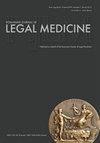成功停止的综合方法
IF 0.4
4区 医学
Q4 Medicine
引用次数: 0
摘要
.放弃不仅意味着犯罪行为的停止或不存在,还包括犯罪频率和严重程度不断下降的趋势,从而使专家能够研究整个过程,直至完全放弃犯罪。国内和国际文献以及大部分相关研究都集中在犯罪活动的根本原因上,忽略了促成放弃犯罪生涯的因素。然而,与前者不同的是,缓刑研究集中在有助于摆脱犯罪生活的因素上。犯罪学文献区分了在中止过程中起作用的两大类因素,即结构因素和心理因素。考虑到单方面方法固有的局限性,绝大多数当代研究人员赞同综合方法,因为很明显,社会、环境和心理因素对中止都有自己的影响。本文章由计算机程序翻译,如有差异,请以英文原文为准。
An Integrative Approach to Successful Desistance
. Desistance not only denotes the cessation or absence of criminal behavior but also includes a continuously decreasing tendency in offence frequency and seriousness, thus enabling experts to study the entire process up to the very point of giving up delinquency altogether. Domestic as well as international literature and the bulk of the relevant studies have been focusing on the underlying causes of criminal activity, overlooking the factors facilitating the abandonment of the criminal career. However, unlike the former, desistance research is centered on factors that contribute to leaving criminal life behind. Criminological literature distinguishes between two large groups of factors that are at play in the process of desistance, i.e. structural and psychological factors. Taking cognizance of the limitations inherent in unilateral approaches, the vast majority of contemporary researchers endorse an integrative approach since it is obvious that social, environmental, and psychological factors each have their own influence on desistance.
求助全文
通过发布文献求助,成功后即可免费获取论文全文。
去求助
来源期刊
CiteScore
0.50
自引率
25.00%
发文量
0
审稿时长
6-12 weeks
期刊介绍:
The Romanian Journal of Legal Medicine, the official publication of the Romanian Legal Medicine Society, is devoted to the publication of the original investigations, observations, scholarly inquiries and reviews in the various branches of the forensic sciences.
These include forensic pathology and histochemistry, clinical forensic medicine, medical malpractice, traffic medicine, chemistry, biochemistry, thanatochemistry, clinical and forensic toxicology, alcohology, biology (including the identification of hairs and fibres), the physical sciences, firearms, and document examination, physical anthropology, serology, forensic genetics and paternity (with special emphasis on recent advances in DNA technology and PCR), forensic psychiatry and behavioral sciences, forensic odontology, law and ethics, history of forensic sciences. RJLM also includes similar submissions dealing with forensic-oriented aspects of the social science and the area where science and medicine interact with the law.

 求助内容:
求助内容: 应助结果提醒方式:
应助结果提醒方式:


